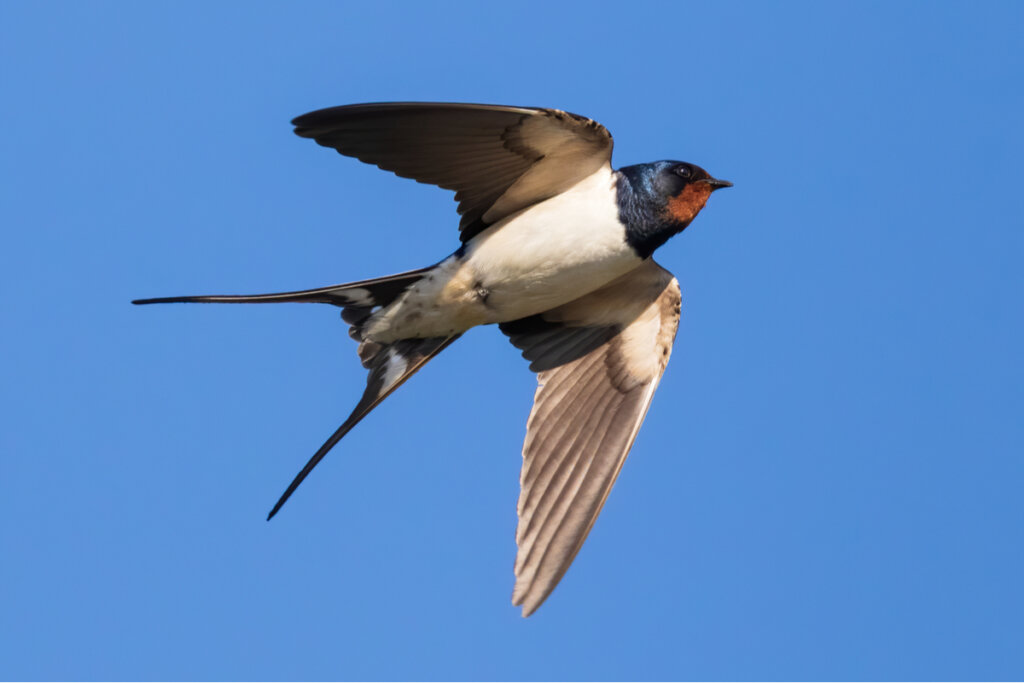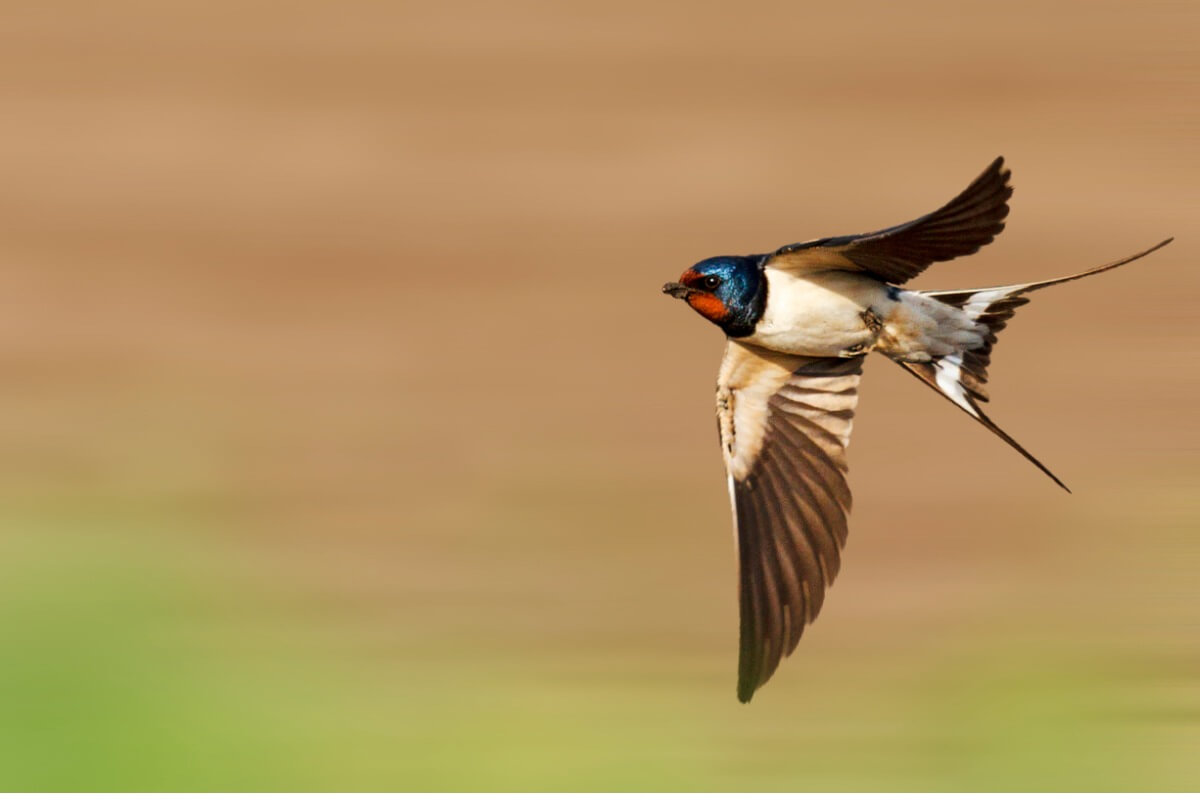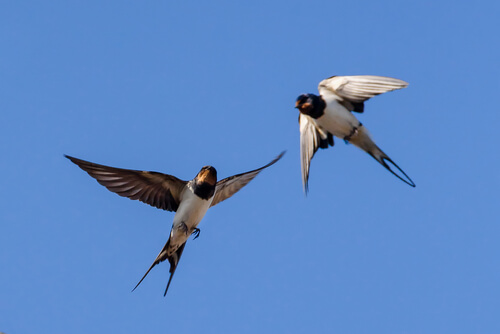Can Swallows Predict the Weather?

You may have heard the saying “when swallows fly high, the weather will be dry”. This popular saying implies that swallows have a hidden ability for weather prediction, which isn’t impossible, but it is difficult to verify. In fact, they wouldn’t be the only species, as there are many animals capable of sensing changes in weather conditions. Find out if it’s true the swallows predict the weather.
Although most of these popular sayings lack scientific support, a few of them express behavior that has an explanation. In the case of the swallow, certain factors are known that could explain this incredible ability. Continue reading and discover how it may be possible to tell the weather from the swallows’ flight.
What are swallows?
The swallow is a small bird that measures about 18 centimeters (7 inches) in length and has a wingspan of 33 centimeters (13 inches). It’s a very familiar species to most people, as they tend to live in close proximity to humans. In fact, in some places, they’re used as indicators that spring has arrived.
The term swallow covers several species that have a diverse distribution throughout most of the world. However, the barn swallow (Hirundo rustica), which is cosmopolitan, is the most popular in several geographical areas. Such specimens love to live near grasslands, crops and wetlands, but they have also adapted to urban environments and can be seen in several cities.
The diet of this species is based on hunting various insects both earth-based and flying ones. This doesn’t cause any kind of inconvenience, as it’s a bird with excellent flying skills. Moreover, it often intercepts its victims with showy acrobatics close to the ground.

Is it true that swallows predict the weather?
Disappointing as it may sound, swallows don’t possess an extra sense for predicting the weather. However, it is true that their behavior can give clues that a storm is approaching. In a contrasting saying to the English one we mentioned earlier, in Spain, they say that when swallows fly low then it’s a sign of impending rain.
The truth of the matter is that swallows often fly close to the ground whether a storm is coming or not, as this is typical behavior of theirs. The big difference is that insects become more vulnerable before and after rain. Because of this, swallows will fly lower to try and catch these creatures.
It’s important to note that weather doesn’t affect the swallows’ ability to soar in the air. In other words, they fly close to the ground by their own choice. However, they do this for the sole purpose of being able to get a succulent feast and capture as much prey as they can.
What do insects have to do with it?
Oddly enough, insects, as we mentioned earlier, have some difficulty moving before, during and after a rainy day. This happens because the humidity in the environment affects their ability to fly, in addition to the fact that they need to seek shelter to avoid dying during waterlogging.
Flying insects have delicate aerodynamics that can be easily affected. The simple change in weight due to the condensation of water droplets on their body is capable of limiting their mobility, causing them to become sluggish. On the other hand, terrestrial species need to escape to a safe place, so they’re more easily exposed.
In fact, it isn’t only rain that can affect insects; any change in weather conditions could pose a danger to these creatures. The cold could freeze them, the heat could dehydrate them and the wind could fracture their exoskeleton if it carries elements with it. Because of this, it’s normal for them to possess mechanisms that help them detect weather variations.
Consequently, the behavior of insects predicts storms due what they suffer and the risk posed by rain. The only problem is that birds take advantage of this phenomenon to devour them, because, unlike them, their wings can withstand humidity and it isn’t too difficult for them to fly.

So why is it said that swallows are able to predict the weather?
Although it’s some insects that seem to be able to predict the weather, swallows are larger and easier for people to observe. Because of this, it’s quite understandable that these popular sayings refer to birds and not to the real culprits.
As mentioned above, several popular beliefs can be explained on a scientific level with the evidence that exists today. However, there are others that aren’t true, and caution is needed before replicating them.
There’s still much to be discovered, and it’s likely for there to be more sayings being proven in the future. For now, we just have to wait for this to occur and discover the secrets that nature holds.
All cited sources were thoroughly reviewed by our team to ensure their quality, reliability, currency, and validity. The bibliography of this article was considered reliable and of academic or scientific accuracy.
- Jaworski, Tomasz & Hilszczański, Jacek. (2013). The effect of temperature and humidity changes on insects development their impact on forest ecosystems in the expected climate change. Forest Research Papers. 74. 10.2478/frp-2013-0033.
- Paumbo, J. (2010). Weather Can Have Major Impact on Insects. Recuperado el 28 de marzo de 2022, disponible en: https://cals.arizona.edu/crop/vegetables/advisories/docs/WeatherandInsects.pdf
- Hume, R. A. (1986). Reactions of birds to heavy rain. British Birds, 79(7), 326-329.
- de Lope Rebollo, F. (1981). Biología comparada de la golondrina común (Hirundo Rustica Rustica L.) y de la golondrina dáurica (Hirundo Daurica Rufula TEMM) en Extremadura. Universidad Complutense de Madrid (Spain).
